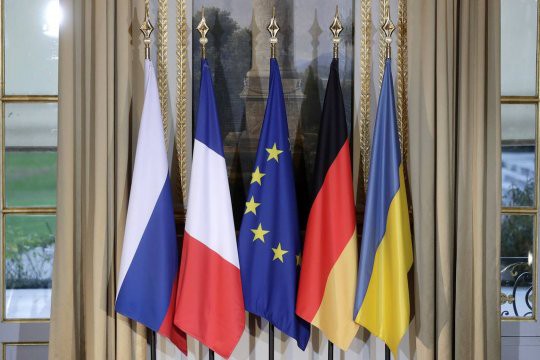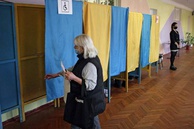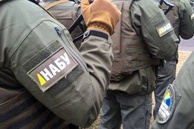Diplomats, intelligence chiefs, presidents and chancellors have become frequent visitors to Moscow of late. According to reports on the outcomes of President Vladimir Putin’s talks with top foreign officials, he made the West understand that the Minsk Protocol is a document of principal importance.
Right after visiting Moscow, the high guest of honor - French President Emmanuel Macron - set out for Kyiv. Unlike Germany, France did not demonstrate that much pressure in connection with the Minsk Agreements and did not show such a strong interest as Germany – to Nord Stream 2. Even though energy resources, Russian gas are issues of concern for France too, Paris has successfully been hiding behind the back of Berlin, which is bearing the brunt of political problems related to Nord Stream 2. But the most important thing is that Macron will soon be facing elections, which means that foreign policy successes endow him with considerable advantages over the competitors. Angela Merkel’s departure from the political scene is making it possible for Macron to pose himself as a leading EU politician, a peacekeeper and negotiator with Russia amid the so far obscure policies of the new German leadership. Putin met Macron with a clear statement – Kyiv is set on dismantling the Minsk Protocol: «Of course, I drew the attention of Mr. President to the unwillingness of Kyiv’s incumbent authorities to comply with their commitments under the Minsk agreements and the Normandy Format, including those reached at summits. Nothing has been achieved on such issues as constitutional reform, amnesty, local elections, the legal aspects of the special status of Donbass. Nothing has been done until now to enshrine the Steinmeyer Formula into Ukrainian laws».[i] The Russian president underscored that there is no alternative to the Minsk Protocol, though the Ukrainian authorities, including President Vladimir Zelensky, refuse to observe them. The statement that there is no alternative to the Minsk Protocol, voiced by President Putin, was shared by representatives of France and the USA. Even the Pope chose to join in the talks, having urged the nations concerned to pray for peace in Ukraine: «Let’s pray on to God for peace, so that we could overcome tension and avert the threat of war through serious dialogue, let’s pray that the Normandy Format talks pave the way to this goal. Let’s not forget that war is madness».[ii]
In Kyiv, Macron did not face the warmest of welcome. Ukraine insists that the Minsk Protocol is impossible to observe, should be reconsidered and abolished. This is what Ukrainian leaders continue to communicate to the world community, even if without any public support.
After seeing Macron off to Kyiv, Putin said the following: «Some of his ideas, proposals, even though it’s too early to talk about them, I do find reasonable enough to underlie our further joint steps [on settlement in Ukraine] – D.B.]».[iii] Before leaving for Kyiv, Macron outlined his intentions, de facto following the points of the Steinmeyer Plan: «There are very sensitive issues on constitutional reform, special status, and on the elections [as part of the Minsk Protocol – D.B.], which are under consideration at the moment and will soon be developed».[iv] Macron spoke about the provisions which earned comments from Ukrainian Security Council Secretary Alexei Danilov, who said in an interview that their implementation would ruin Ukraine.[v] Thus, Kyiv’s desire to meet with the French president is pretty clear – it is set on explaining things to Macron.
As it happens, what Paris views as full of opportunities is fraught with disaster for Kyiv. This is because Macron is talking about peace in Europe, while Zelensky-Danilov – about how to preserve power and the current political regime in Ukraine.
One more detail characterizing Europe’s genuine attitude to Kyiv and Ukraine’s place in Europe is that in the course of his visit to Kyiv Macron converted his foreign policy options into French business profits in the interests of his political career: «After Emmanuel Macron’s visit to Kyiv France said it was allocating to Ukraine 1.2 billion euros, of which 900 million, Ukraine said, would go to purchase 130 French electric locomotives, produced by Alstom Company. However, as it turned out, the French will not provide money but financial guarantees in line with which local banks will allocate loans to purchase the locomotives in question. Since the trains are to be bought on credit, the purchases will be made without a tender. Alstom has thus got a huge contract from Ukraine».[vi] Ukrainian media wrote in January that Alstom had tried to sell its electric locomotives to Argentina for nearly the same sum of 900 million dollars but lost in tender to the Russian “Transmashholding”. Macron has thereby helped the French producer, but, in the long run, at Ukraine’s expense – it's Kyiv that will repay the loan and buy spare parts in the future. There was no way the two sides could have avoided signing agreements on military and technical cooperation – they agreed on the supply of patrol boats for Ukrainian frontier service, to be financed through separate arrangements, and arguably, on the basis of a plan which the French business finds particularly attractive.[vii]
After meeting with Macron, Zelensky, as official sources say, made no mention of the Minsk Protocol. He nevertheless remarked on it in response to Putin’s statement, missing the point. What he spoke about was the Normandy Format: «We expect that in the near future, under the agreements signed during the Paris summit in December 2019, we will be able to hold the next talks of Normandy Four leaders. A major step in this direction is activization of the dialogue at the political advisor level. Hopefully, the meeting in Paris on January 26,, 2022 and the forthcoming talks in Berlin will bring us closer to the Normandy summit».[viii] The Minsk agreements were mentioned by Macron: «The French president remarked that Ukraine confirms its readiness to fulfil the Minsk Protocol, which paves the way to de-escalation and sustainable peace».
Moscow’s reaction to Macron’s visit to Kyiv was fairly explicit. The French president’s trip to Ukraine resulted in positive signals regarding the Minsk agreements, but Moscow did not hear any statements suggesting Kyiv’s readiness to quickly act on its commitments, presidential press-secretary Dmitry Peskov said.
In his opinion, the situation will clarify after the presidents of Russia and France have had a phone conversation to discuss the trip, as arranged earlier.
Now – a string of events and facts.
On February 7 US Secretary of State Anthony Blinken said Ukraine would be prepared to move forward on the issue of a special status for Donbass if there was an appropriate order of implementing the Minsk Protocol: «The Protocol envisages a special status for Donbass, and I believe that provided they follow the proper order, the Ukrainians will be ready to act on them».[ix]
As if in response, on February 9 Ukrainian media publish ‘with relief’ quotations from US State Department ex-representative for Ukraine Kurt Walker. The Minsk agreements for the settlement of the conflict in Donbass are hopelessly wrong, and the West acted wrongly, pushing Ukraine towards further unilateral concessions. He said: «I think Ukraine has done its utmost. We must press Russia to fulfil the Minsk agreements...».[x]
The above statement is designed to balance Blinken’s remarks, even if in terms of information, since Walker and Blinken are in different weight categories. These information games demonstrate a gap between what leaders of different countries discuss at the negotiating table and what they say about the talks to the public.
On February 5, prior to the above statements, the Ukrainian “Weekly Mirror” said it was in possession of alarming information which featured a letter by representatives of Donbass republics N.Nikonorov and N.Deiniy to the Special Representative of the OSCE Chairperson-in-Office in Ukraine and in the Trilateral Contact Group Ambassador Mikko Kinnunen. In this letter, the edition says, representatives of Donetsk and Luhansk, citing reports they obtained from the Russian side on the results of a meeting of political advisors to the heads of Normandy Four countries on February 26, argue that: ««the Ukrainian side, acting under guarantees from Germany and France, assumes the commitment to submit to the Contract Group [a session of which was set for February 8-9 – D.B.] their written response to all negotiated proposals on a comprehensive peace settlement in Donbass in accordance with the Minsk Protocol for the purpose of launching a constructive dialogue on the possibility of discussing all these proposals and coming to agreement».[xi] In particular, they focus on conceptual approaches of Donbass republics to “the parameters of a future regime (special status)”, which are presented in detail in the draft “Plan of Action (Roadmap) on the settlement of conflict in accordance with Minsk agreements”, which they sent to the Trilateral Contact Group on October 8, 2020 and which was revamped on September 23, 2021.
This leak which occurred before Macron’s visit to Moscow and Kyiv discloses the strategy and unveils the possible approaches to the Minsk agreements. This confirmation, if not of the sheer fact of the existence of the document in question, then, at least, of the agenda of the talks, became clear from statements by Macron following his meetings with President Putin. In addition, “the special status of Donbass” was mentioned by Blinken as well.
The outcomes of the talks and of Macron’s trip were put to test at the meeting of political advisors to the heads of Normandy Format countries on February 10. However, the talks brought no results. Russia’s representative – deputy head of presidential administration Dmitry Kozak said: «We tried to come to agreement on the final statement of our talks proceeding from the previous meeting in Paris on January 26. We [back then] agreed that the Normandy Format should by all means overcome all the differences which exist regarding the interpretation of the Minsk agreements, since the Normandy Format is a controlling mechanism in relation to the Minsk negotiating process in the Contact Group. But we failed to overcome these differences today».[xii] Judging by Kozak’s statements, Ukraine has been persistent in opposing the provisions of the Minsk agreements and has demonstrated an irreconcilable stance by refusing to remove the differences on a post-conflict settlement in Donbass: «In words, we were unanimous with Germany and France on how we should proceed with political issues, but Ukraine’s position is uncompromising. They even refused to quote the Minsk agreements in the draft statement submitted for consideration, refused to cite the Minsk documents, which stipulate that issues related to a post-conflict status of these territories should be settled in consultations and discussions with representatives of separate regions [Donbass]. This is a key difference which Ukraine refused to settle». Оne of the key principles is that in accordance with the Minsk Protocol «all substantial issues should be settled in the Minsk format, in the Trilateral Contact Group, which embraces representatives of Ukraine and separate areas of Donetsk and Luhansk republics». However, as becomes clear from Weekly Mirror’s insider info and the position of the Ukrainian side, Ukraine has no intention of coming to agreement with the Minsk Protocol party, represented by the Donbass republics.
This means that top officials’ trips to Moscow and Kyiv have resulted in the unanimous position of France and Germany but have done nothing to influence Kyiv. Dmitry Kozak had this to say as he commented on the position of France and Germany after the political advisors’ meeting: «I didn’t see any signs of readiness on the part of France and Germany to put pressure on Kyiv on the issue of complying with the Minsk Protocol. What I saw was the attempts to find a comfort niche so that Ukraine could continue the policy it has been pursuing throughout the past eight years».
Kozak described the situation as a dead end, since after eight years, the parties involved have failed to come to consensus on Minsk process in the Normandy Format, the negotiating process on a settlement in the southeast of Ukraine has been in limbo, and a way out of this uncertainty depends on what further steps the Ukrainian authorities choose to take.
Further steps by Kyiv become clear from the position of the chief of Ukrainian presidential administration Andrei Yermak, who announced Ukraine’s intention to continue talks and who made it clear that «it’s necessary to deblock and activate the work of the Trilateral Contact Group». But, judging by what is happening, these are no more than words. Kyiv will focus on talks about «security guarantees for Ukraine»: «We believe that we must talk about security guarantees today, there is no need to wait. Without a ceasefire there can be no European security system in Ukraine». Yermak also made it clear that Ukraine’s energy security is part of general security: «We consider Nord Stream 2 part of energy security and, as Germany and the USA agreed, Ukraine should be provided with certain guarantees. We expect that our partners will act on their commitments and that Ukraine will get not only economic security guarantees but general security guarantees as well».[xiii] Thus, Kyiv has a broad interpretation of the Minsk agreements – it raises the issue of some security guarantees in the face of a mythical aggression, it makes both the agreements and security issues dependent on the transit of gas, and it demonstrates solidary with the USA on the issue of blocking Nord Stream 2, thereby seeking a greater role for Washington in negotiating processes. For Kyiv, this is nothing new.
Judging by statements by Russian and Ukrainian representatives, what the political advisors managed to agree on is to continue meetings and talks.
The Minsk Protocol is not just a document of principal importance but a major European security knot which should be cut rather than tightened, for tightening the knot will deprive Ukraine, Donbass republics and the Black Sea Region of prospects for stability. Thus, the emerging second wind for the Minsk Protocol makes it possible to feel cautiously optimistic and expect a further movement towards establishing peace in Donbass and alleviating tension in the region.
The opinion of the author may not coincide with the position of the Editorial
[i] https://ria.ru/20220208/press-konferentsiya-1771577154.html?utm_source=yxnews&utm_medium=desktop
[ii] https://lenta.ru/news/2022/02/09/mad_war/
[iii] https://lenta.ru/news/2022/02/08/ideas/
[iv] https://strana.news/news/375587-putin-i-makron-reshili-po-donbassu.html
[v] https://interaffairs.ru/news/show/33580
[ix] https://ria.ru/20220207/status-1771559107.html
[xii] https://tass.ru/politika/13675437
[xiii] https://tass.ru/mezhdunarodnaya-panorama/13675435
read more in our Telegram-channel https://t.me/The_International_Affairs

 17:31 15.02.2022 •
17:31 15.02.2022 •



























